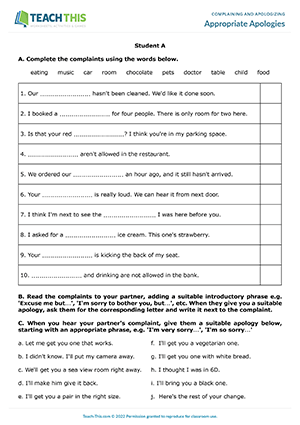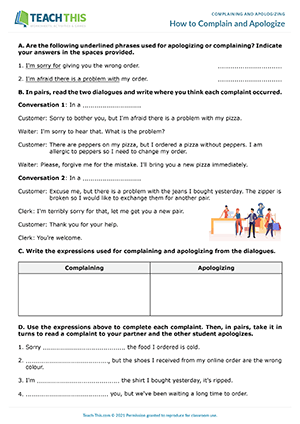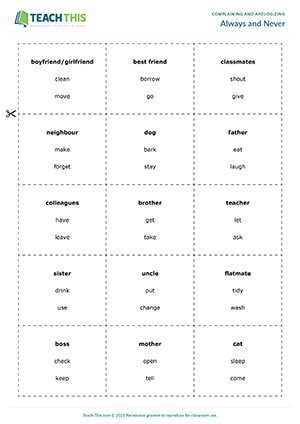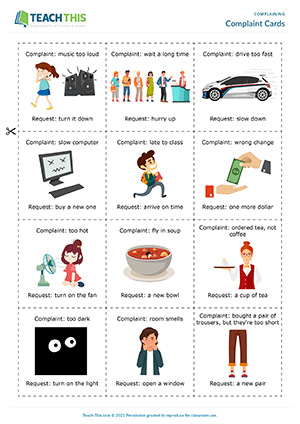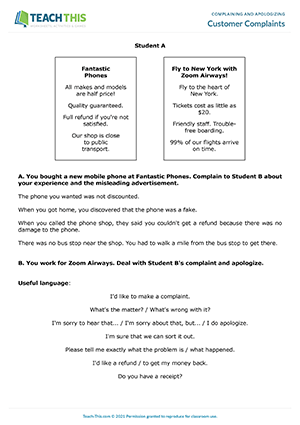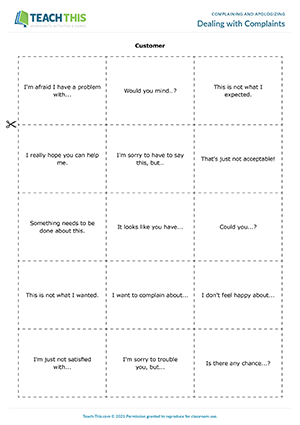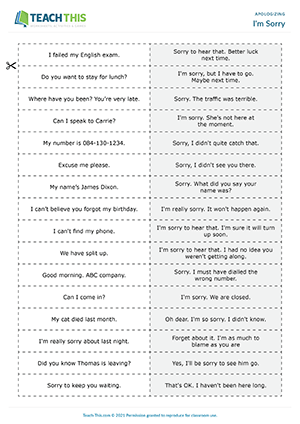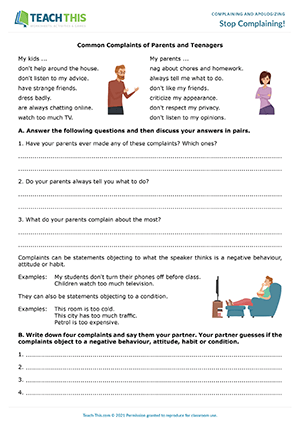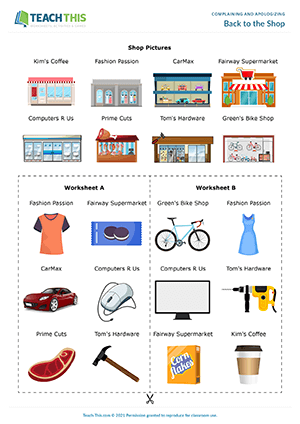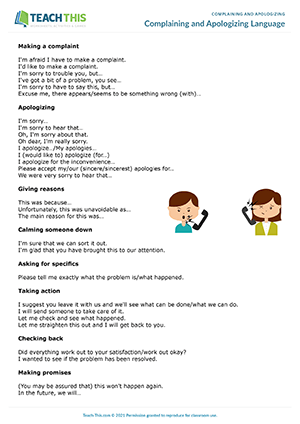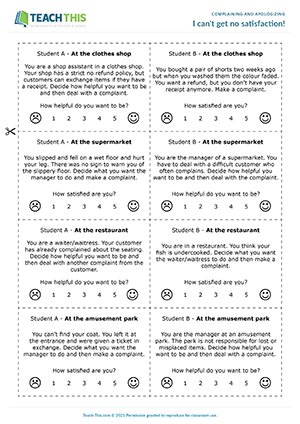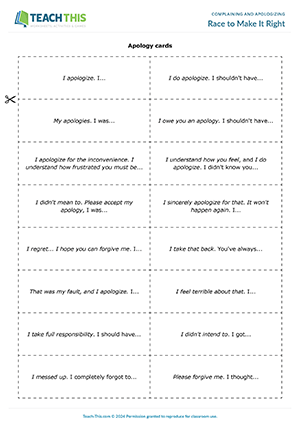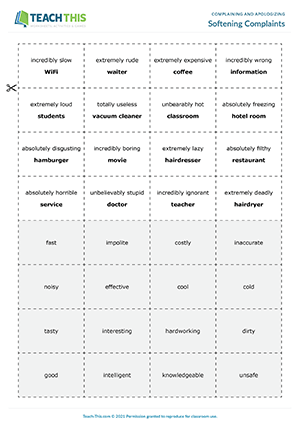In this productive complaining and apologizing speaking activity, students practice making complaints and giving apologies using prompts. Working alone, students complete complaints with the words provided. Next, students take turns reading out their complaints, adding a suitable introductory phrase, e.g. Excuse me, but..., I'm sorry, but.... Their partner then checks their worksheet to find a suitable apology and says it with an appropriate phrase, e.g. I'm very sorry..., I'm so sorry... If the other student agrees the apology matches the complaint, they ask for the letter of the apology and write it next to the complaint. It's then the other student's turn to read out a complaint. The first pair to match all their complaints with the correct apologies wins.
In this insightful dealing with complaints worksheet, students identify and practice expressions for making complaints and saying sorry. Students begin by reading two phrases and identifying which is used to make a complaint and which is used for an apology. Next, in pairs, students read two complaint dialogues and then write where they think each complaint occurred. After that, students read the conversations again and categorise the expressions used for complaining and apologizing into two columns. Students then use the expressions to complete complaints. Finally, in pairs, students take turns reading each complaint to their partner who apologizes.
Here is a communicative making complaints role-play activity to help students practice complaining with always and never. In pairs, students take turns picking up a card that shows the subject of a complaint and two verbs. Using a dialogue from the board, the student with the card complains about something the subject is always doing and something the subject never does, e.g. 'She’s always moving things so I can’t find them, and she never cleans up after herself.' The other student then makes a suggestion about the complaint. Students continue in this way until all the cards have been used. Finally, pairs role-play some of their dialogues in front of the class.
In this communicative making complaints speaking activity, students role-play making complaints, apologies and requests in different situations. In pairs, students look at their cards that each show a picture, a complaint and a request. Students then write who they are complaining to and where they are on the other side of each card, e.g. waitress, in a restaurant. Next, students hold their cards so that the picture is facing them and the side they have written on is facing their partner. Students then take turns making a complaint to their partner who looks at who and where they are on the card and apologizes appropriately. The other student then makes a request and their partner gives a suitable reply. Afterwards, students exchange cards, repeat the process and then move on to the next cards. Finally, pairs role-play the complaints to the class.
In this communicative complaining and apologizing role-play, students practice making and dealing with complaints about misleading advertisements. In pairs, students role-play the first complaint about buying a mobile phone with one student complaining and the other dealing with the complaint and apologizing. After that, students swap roles and role-play a second misleading ad complaint based on a flight. Afterwards, pairs present their role-plays to the class.
In this communicative dealing with complaints game, students role-play handling complaints using expressions on cards to score points. First, students brainstorm six situations in which people make complaints. In pairs, students then role-play complaints for the situations on the board. The aim of the game is to use as many expression cards as possible during the role-play. In each role-play, students take turns being the person complaining and the person dealing with the complaint. Students start with the first scenario on the board. Each student then takes one card that corresponds to their role. Students begin the role-play and as quickly as they can they use the expression on the card in a complete sentence. When they have done this, and while continuing the role-play, they take another card and repeat the process. Students score one point for each correctly used expression. This process is repeated for all six situations. The student with the most points at the end of the game wins.
In these two engaging apologizing games, students practice expressions with sorry. In groups, students take turns turning over one card from each set. If the statement or question matches the response with sorry, the student keeps the two cards and has another turn. If not, the student turns the cards back over. The student with the most pairs of cards at the end of the game wins. Afterwards, students put the statement and question cards in a pile and take turns picking up a card and reading it to the group. The group members then race to give an appropriate response using sorry. The first student to do this wins the card. The student with the most cards at the end of the game wins.
In this useful complaining and apologizing worksheet, students learn how to make common complaints, requests and apologies. First, students read common complaints made by parents and teenagers, answer questions based on the topic and then discuss them in pairs. Next, students read about the reasons for complaints. Students then write down four complaints and say them to a partner who guesses if they object to a negative behaviour, attitude, habit or condition. After that, students learn how to make a request following a complaint and use phrasal verbs to request action. Students then match expressions to phrasal verbs. Afterwards, students use the phrasal verbs to make requests that follow a complaint. Next, students learn how to make apologies in different ways. Finally, in pairs, students use picture prompts to write mini-dialogues where they make complaints, requests and apologies which they then present to the class.
In this free shop complaints game, students role-play making complaints in a shop and their classmates try to guess where they are and what product they are complaining about. In teams, students imagine that items they bought are faulty and that they have to return them to the shops. Students then role-play shop complaints about the products, without saying where they are or what product they are complaining about. In teams of two, students take turns choosing an item from their card and role-playing a complaint to another team with one student being the customer and the other the shop assistant. The customer makes a complaint about the item and tries to get an exchange or refund. The other team listens to the role-play, looks at a set of shop pictures, and decides which shop the team is in and what product the complaint is about. Teams score one point for choosing the correct shop and two points if they guess the correct product. The team with the most points at the end of the game wins.
This free complaining and apologizing phrases handout provides students with some useful expressions to use when making and dealing with complaints. The sheet covers language and phrases for making a complaint, apologizing, giving reasons, calming someone down, asking for specifics, taking action, checking back and making promises.
In this communicative making complaints role-play activity, students make and deal with complaints in various situations and score how satisfied they are with each outcome. In pairs, students role-play each situation with one person making the complaint and the other dealing with the complaint and deciding how to react. The person dealing with the complaint circles the 1 to 5 scale on their card, depending on how helpful they want to be, one being not at all helpful and five being very helpful. When each role-play has finished, the student making the complaint decides how satisfied they are about the outcome and circles the appropriate number on their card. The two students then compare their numbers to see if they match or not. This continues until all the role-plays have been completed. Afterwards, pairs report back what happened in each situation and how satisfied the person complaining felt and why.
In this engaging making apologies game, students race to match and complete apologies in response to complaints and expressions of dissatisfaction. In groups, one student turns over the first statement card and reads the complaint or expression of dissatisfaction to the group, e.g. 'You missed another appointment.' All the students then race to find a matching apology card in response to the statement and complete it in their own words, e.g. 'I apologize. I completely lost track of time.' The first student to make a suitable match and complete the apology prompt appropriately wins, keeps the pair of cards, and sets them aside. If a student makes an incorrect match or doesn't complete the apology appropriately, they are out of the round, and the other students can try to answer. The next student then turns over a statement card, and so on. The first student to get rid of all their apology cards is the winner. Students can play several games to practice all the language for making apologies.
In this communicative making complaints speaking activity, students learn how to soften complaints using not very and rather. In pairs, one student places nine adjective cards face-up in a three-by-three square. Their partner takes an adverb-adjective collocation card from their pile and makes a complaint using the vocabulary on the card, e.g. 'Excuse me, but this computer is incredibly slow.' If the other student has an adjective in their square that can soften the complaint, they soften the complaint using not very for a positive adjective or rather for a negative adjective and turn the card over, e.g. 'Excuse me, but this computer is not very fast.' Their partner then makes another complaint, and so on. When three cards have been turned over in a row, students swap roles. This continues until the students have played several rounds to practice the language.
Latest Free
Resources
- Call and Respond
Business - Telephoning (B1)
Date Added: 24th of March
- Small Talk Techniques
Small Talk (B1)
Date Added: 20th of March
- Jigsaw Reading
Reading Exam Preparation (B1)
Date Added: 7th of March
- Writing Jeopardy
Writing Exam Preparation (B1)
Date Added: 6th of March
- Present Perfect Bingo
Present Perfect Yes No Questions (A2)
Date Added: 4th of March
Latest Member
Resources
- Business Telephoning Board Game
Business - Telephoning (B1)
Date Added: 24th of March
- Business Networking Board Game
Networking (B2)
Date Added: 21st of March
- Are You Following Me?
Telephoning (B1)
Date Added: 20th of March
- Who's calling, please?
Telephoning (A2)
Date Added: 20th of March
- Essay Station Rotation
Writing Exam Preparation (B1)
Date Added: 20th of March



